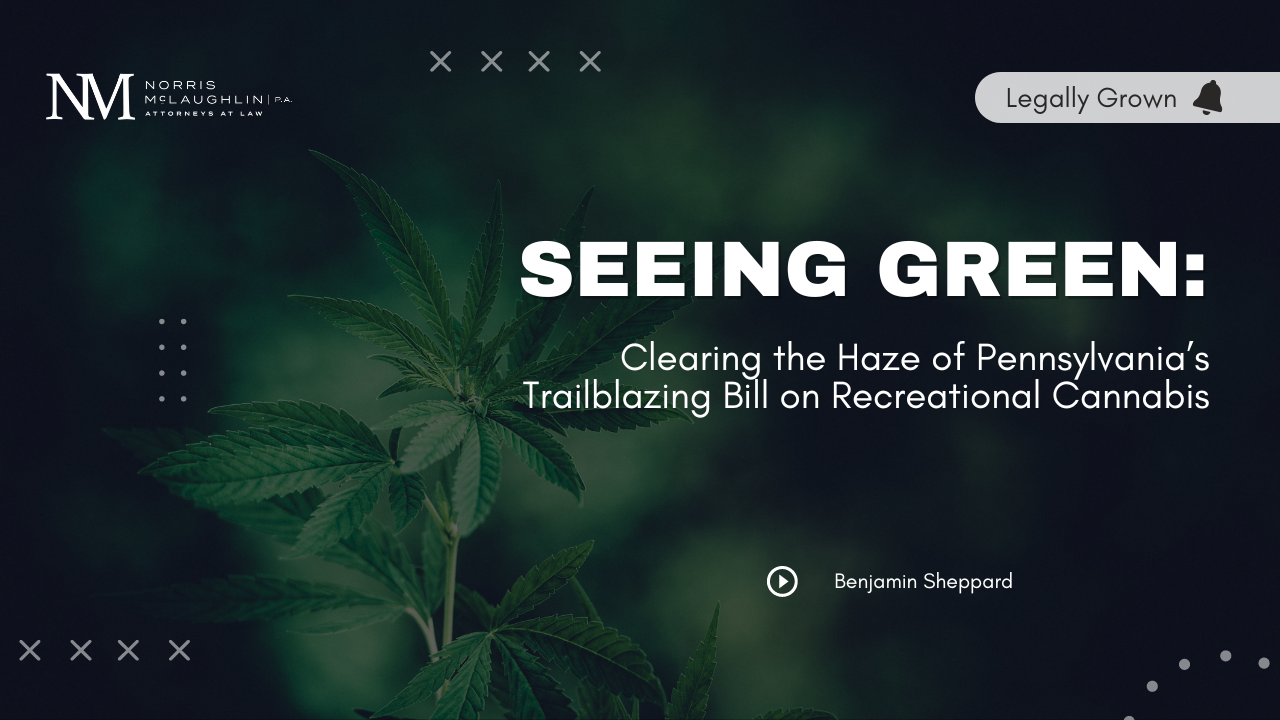Seeing Green: Clearing the Haze of Pennsylvania’s Trailblazing Bill on Recreational Cannabis

If you're following the cannabis landscape, it's time to zero in on Pennsylvania. There, State Senators Sharif Street (D-Philadelphia) and Dan Laughlin (R-Erie) have unveiled Senate Bill 846 (the “Bill”), an intricate 232-page bill designed to light up the path for legal recreational cannabis in the Keystone State.
This blog post is the opening act in a series that aims to help investors, entrepreneurs, and the canna-curious to understand Pennsylvania's dive into legalized recreational cannabis. So, sit back as we untangle the intricate web of this groundbreaking, bill beginning with how Pennsylvania will define the lawful use of cannabis.
Lawful Cannabis Use
Should the Bill pass, it goes into effect 180 days after being signed into law. At that point, adults 21 and older can freely buy, possess, and consume cannabis, albeit with some strings attached. For instance, you can only hold up to 30 grams (a little over 1 ounce) of cannabis flower or up to 1,000 milligrams of THC in edible or non-edible products.
Minors caught with recreational cannabis could face a sliding scale of consequences, ranging from written warnings for first-time offenses to monetary fines for repeated violations. To curb underage sales, the bill endorses tech solutions, such as ID scanners like those found in bars. Also, adults caught distributing cannabis to minors would be barred from buying recreational cannabis in the future.
Certain Protections for Recreational Cannabis Users
The Bill doesn't just stop at legalization; it affords various protections for recreational cannabis users. Here's a rundown of some key protections:
- Consumer Safeguards: Adults over 21 are protected from arrest or prosecution for cannabis use within specified limits.
- Criminal Procedure: Having or applying for a cannabis business license does not constitute probable cause for a criminal search.
- Medical Care: Using cannabis won’t disqualify you from receiving medical treatments, including organ transplants.
- Firearm Ownership: Cannabis use will not limit your ability to own firearms in Pennsylvania.
- Child Custody: Cannabis use alone cannot be a deciding factor in child custody cases.
- Child-Welfare Actions: Cannabis use cannot be the sole basis for a proceeding by a child welfare agency or family or juvenile court.
- Adoptions and Foster Care: Cannabis use alone is not sufficient grounds for adverse findings in child adoption or foster care.
- Wills and Estates: Cannabis use cannot be employed as evidence against someone’s ability to manage an estate or to determine their state of mind at the time of a will’s execution.
However, the bill has a blind spot: it doesn't offer employment protections for recreational cannabis users, unlike Pennsylvania’s medical cannabis provisions, which provide employment protection from adverse employment action on the basis of an individual’s “status” as a medical cannabis user. This oversight is frustrating, especially since neighboring New Jersey and New York, along with four other states, provide employment protections for recreational cannabis users. Someone could potentially face employment repercussions for legally using cannabis recreationally. This gap will likely require additional legislative attention.
Federal Law: The Elephant in the Room
Remember, federal law still considers cannabis a Schedule I controlled substance. While the Bill generally ends state criminal penalties for recreational cannabis, it doesn't create immunity to federal law such as the Controlled Substances Act, which federally criminalizes cannabis both recreationally and medicinally. Importantly, employees of federal contractors, who are subject to federal regulations like the Drug-Free Workplace Act, must comply with additional regulations regarding cannabis use.
Final Puffs
Pennsylvania's Senate Bill 846 is a major piece of legislation that could potentially set a new standard for legalized recreational cannabis. As the possibility of legalization becomes clearer, it's crucial for consumers and would-be cannabis entrepreneurs to closely monitor this legislation.
Stay tuned for more in this series, as we continue to explore Senate Bill 846.
For information about national and state cannabis law matters and regulatory compliance, please contact our Cannabis Law Practice Group attorneys: William J. Beneduce, Esquire (wjbeneduce@norris-law.com) for New Jersey Cannabis matters or Benjamin P. Sheppard, Esquire (bsheppard@norris-law.com) for Pennsylvania and/or New Jersey cannabis matters, or contact our offices at (908) 722-0700.




